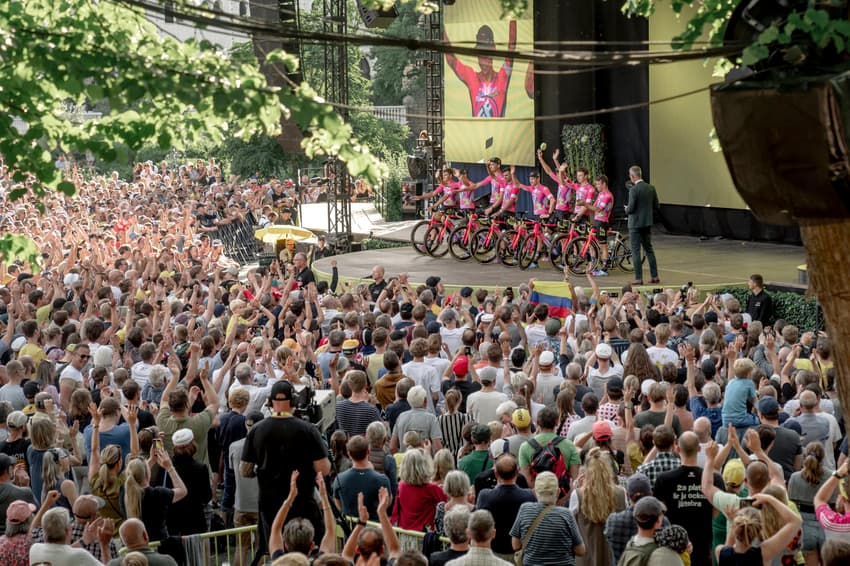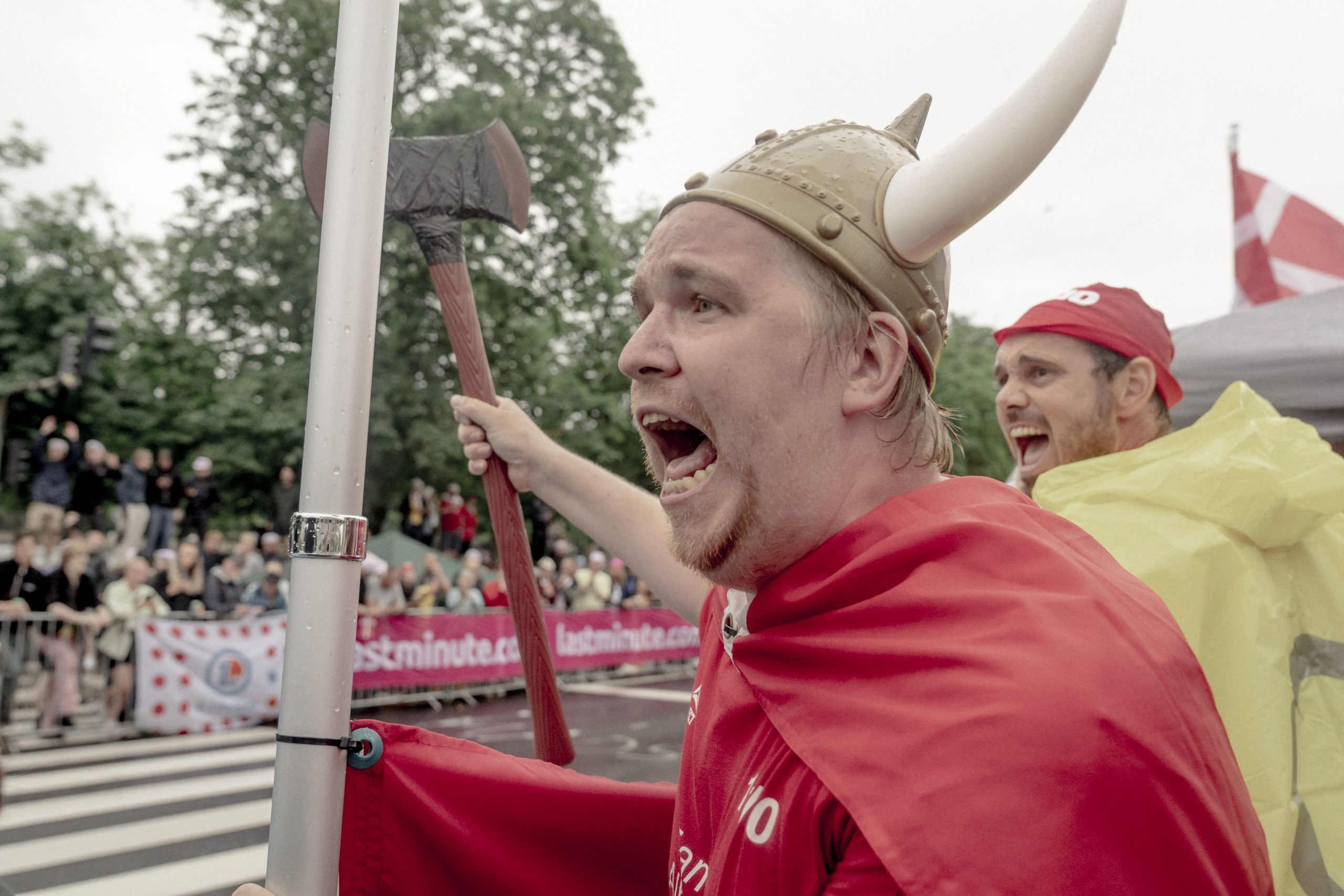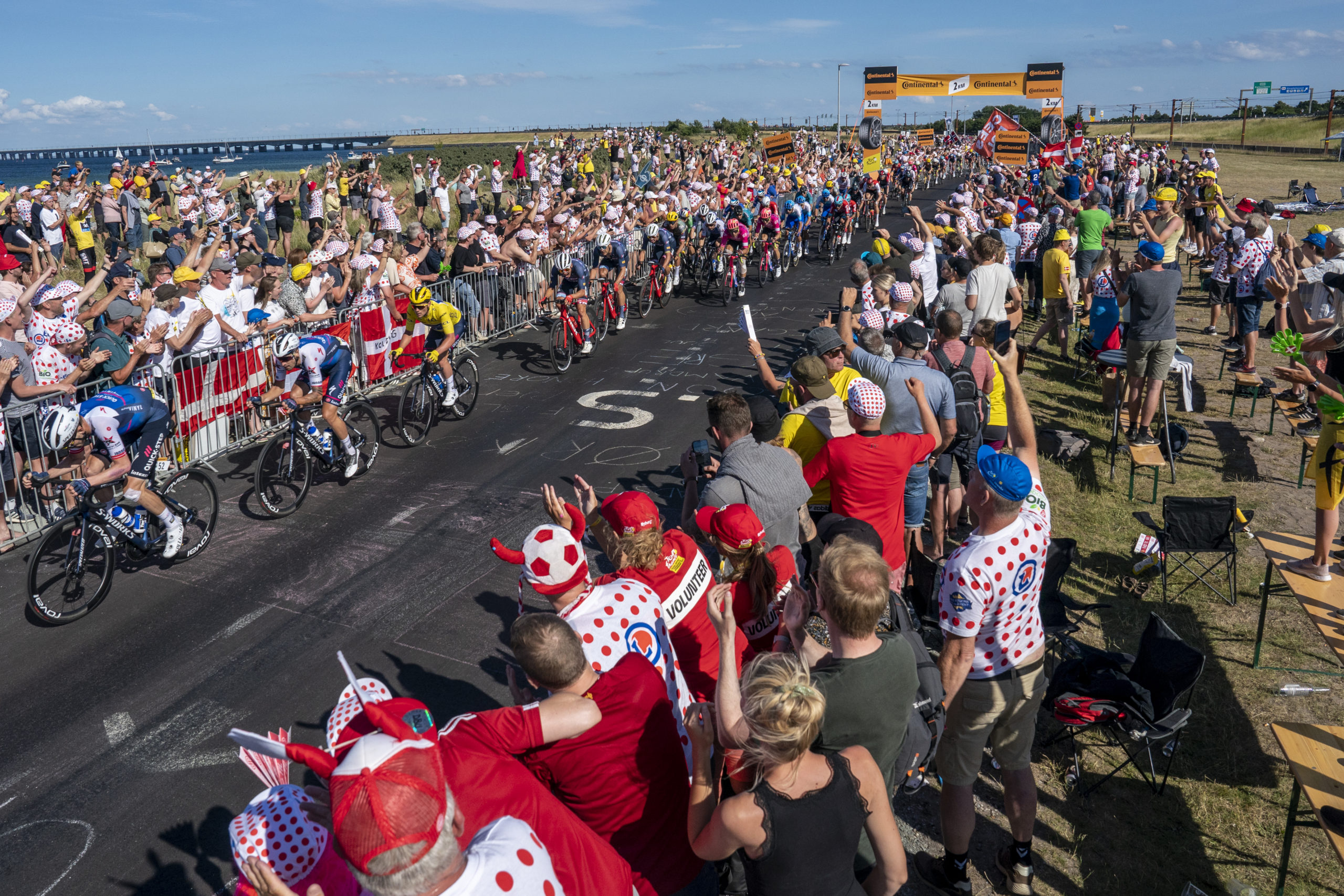How Denmark has fallen in love with the Tour de France

Denmark could have its first Tour de France winner since 1996 and the country has been gripped by the world's most famous cycle race.
In the Tour de France, teams represent corporate sponsors rather than their home countries — but that doesn't mean national pride doesn't come into play.
It certainly has in Denmark this year where there are high hope the country could have its first winner since 1996. Jonas Vingegaard leads the general classification after stage 17 this year.
What's the reaction been like in Denmark?
Danish fans have earned their 'cycle-mad' reputation in 2022 — when the teams were officially presented in a ceremony in Copenhagen amusement park Tivoli, a stunning 15,000 fans turned out to cheer them on. Park staff said only rock stars had garnered that kind of welcome before.
According to estimates by the ASO, the company that organises the Tour, as many as 2 million Danes watched the three stages the country hosted in person, while TV coverage captured 77 percent of the Danish marketshare.
They've been rewarded with an impressive performance by Danish riders across several Tour teams, and Jonas Vingegaard in particular has become a social media darling.
READ ALSO: Thousands of cycling fans in Copenhagen for Tour de France departure

Fans braved rain and camped out for hours ahead of the Grand Départ on July 1. Photos: Mathias Svold/Ritzau Scanpix
Stage wins
Three Danes have won stages so far this year — Magnus Cort (age 29 and a Bornholm native) took the yellow jersey at the foothills of the Alps in the tenth stage, Jonas Vingegaard won the mountainous eleventh stage, and Mads Pedersen (26, of Aarhus) won the thirteenth stage in a sprint.
It's the most stages Danes have won in 26 years, since the 1996 race when Bjarne Riis and Rolf Sørensen took three stages between them. That was of course the year Riis was crowned overall winner in Paris.
Last week, Pedersen told journalists he's proud to be part of a 'big generation' of successful Danish cyclists, whose emergence he attributes to "hard work from local clubs [and] junior teams."
"It's a huge thanks to everyone who was supporting all the riders as kids and from there on let's just hope that people will keep supporting talents and people who are dreaming," he added.
READ ALSO: IN PICTURES: The Tour de France starts in Denmark
Overall favorite
Vingegaard, a baby-faced 25-year-old from Fynen, starts July 21 with a 2 minute, 18 second lead in the general standings that may already be insurmountable for returning champ Tadej Pogačar of Slovenia.
The eighteenth stage is the last mountain battle for the two riders and unless Pogačar manages to significantly whittle down Vingegaard's advantage, the Dane is all-but assured to win the yellow jersey as the 2022 Tour de France winner in Paris on Sunday.

Even lonely stretches of the Tour route outside cities were crowded with fans. Photo: Søren Bidstrup/Ritzau Scanpix
What's at stake?
Beyond bragging rights, there's a €2,288,450 pot of prize money (over 17 million kroner) to be divvied up between Tour de France winners. The overall winner is awarded €500,000 — which is generally further portioned up to include teammates and staff — while second and third place receive €200,000 and €100,000.
The winners of each stage take home €11,000 (number two and three receive €5,500 and €2,800, respectively), and jerseys also net you a tidy payday, as will top classifications. The winning team at the end of the race is given €50,000 (second and third get €30,000 and €20,000).
There are also prizes you might not expect, including a completion award — every rider who finishes the race receives €1,000 — and the 'Super Combative' award, €20,000 that goes to whoever the jurists decide was the most aggressive.
Comments
See Also
In the Tour de France, teams represent corporate sponsors rather than their home countries — but that doesn't mean national pride doesn't come into play.
It certainly has in Denmark this year where there are high hope the country could have its first winner since 1996. Jonas Vingegaard leads the general classification after stage 17 this year.
What's the reaction been like in Denmark?
Danish fans have earned their 'cycle-mad' reputation in 2022 — when the teams were officially presented in a ceremony in Copenhagen amusement park Tivoli, a stunning 15,000 fans turned out to cheer them on. Park staff said only rock stars had garnered that kind of welcome before.
According to estimates by the ASO, the company that organises the Tour, as many as 2 million Danes watched the three stages the country hosted in person, while TV coverage captured 77 percent of the Danish marketshare.
They've been rewarded with an impressive performance by Danish riders across several Tour teams, and Jonas Vingegaard in particular has become a social media darling.
READ ALSO: Thousands of cycling fans in Copenhagen for Tour de France departure

Stage wins
Three Danes have won stages so far this year — Magnus Cort (age 29 and a Bornholm native) took the yellow jersey at the foothills of the Alps in the tenth stage, Jonas Vingegaard won the mountainous eleventh stage, and Mads Pedersen (26, of Aarhus) won the thirteenth stage in a sprint.
It's the most stages Danes have won in 26 years, since the 1996 race when Bjarne Riis and Rolf Sørensen took three stages between them. That was of course the year Riis was crowned overall winner in Paris.
Last week, Pedersen told journalists he's proud to be part of a 'big generation' of successful Danish cyclists, whose emergence he attributes to "hard work from local clubs [and] junior teams."
"It's a huge thanks to everyone who was supporting all the riders as kids and from there on let's just hope that people will keep supporting talents and people who are dreaming," he added.
READ ALSO: IN PICTURES: The Tour de France starts in Denmark
Overall favorite
Vingegaard, a baby-faced 25-year-old from Fynen, starts July 21 with a 2 minute, 18 second lead in the general standings that may already be insurmountable for returning champ Tadej Pogačar of Slovenia.
The eighteenth stage is the last mountain battle for the two riders and unless Pogačar manages to significantly whittle down Vingegaard's advantage, the Dane is all-but assured to win the yellow jersey as the 2022 Tour de France winner in Paris on Sunday.

What's at stake?
Beyond bragging rights, there's a €2,288,450 pot of prize money (over 17 million kroner) to be divvied up between Tour de France winners. The overall winner is awarded €500,000 — which is generally further portioned up to include teammates and staff — while second and third place receive €200,000 and €100,000.
The winners of each stage take home €11,000 (number two and three receive €5,500 and €2,800, respectively), and jerseys also net you a tidy payday, as will top classifications. The winning team at the end of the race is given €50,000 (second and third get €30,000 and €20,000).
There are also prizes you might not expect, including a completion award — every rider who finishes the race receives €1,000 — and the 'Super Combative' award, €20,000 that goes to whoever the jurists decide was the most aggressive.
Join the conversation in our comments section below. Share your own views and experience and if you have a question or suggestion for our journalists then email us at [email protected].
Please keep comments civil, constructive and on topic – and make sure to read our terms of use before getting involved.
Please log in here to leave a comment.